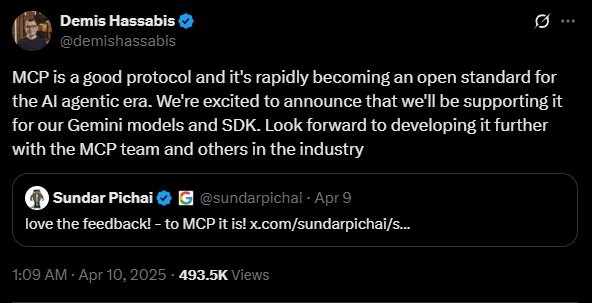Artificial intelligence models continue to grow in power, but their effectiveness is often limited by one key factor: access to the right data at the right time. Each new source of information still requires specific, time-consuming, and fragile integration, thus limiting the real impact of LLMs.
To address this issue, Anthropic – the creator of the Claude model – introduced the Model Context Protocol (MCP), a universal protocol designed to standardize and secure connections between AI models and external data sources or tools. MCP aims to simplify and streamline bidirectional exchanges between AI assistants and work environments, whether local or remote.
A Simple Architecture Designed for Efficiency
The protocol is based on a streamlined yet powerful structure. It defines communication between AI systems, such as Claude or any other conversational agent, and MCP servers, which provide access to resources like files, APIs, or databases. These servers expose specific capabilities, and the AI systems dynamically connect to them to interact with the data as needed.
Specifically, MCP provides a detailed technical specification, SDKs to facilitate development and accelerate adoption, and an open-source repository containing preconfigured MCP servers that are ready to use. This approach aims to make the protocol accessible to developers while ensuring robust integration.
Rapid Adoption by Major Players
The technology is already attracting industry leaders. Claude Desktop, developed by Anthropic, natively integrates MCP. Google has also announced support for the protocol for its Gemini models, while OpenAI plans to integrate it into ChatGPT soon, both on desktop and mobile versions. This rapid adoption highlights MCP’s potential to become a standard for connected AI.


A New Standard for Connected AI
By establishing a common, persistent interface, MCP goes beyond the limitations of traditional APIs. While these typically operate through one-off, often disconnected calls, MCP allows AI agents to maintain a session context, track its evolution, and interact in a smoother, more coherent, and intelligent manner.
This ability to maintain a shared state between the model and tools enhances the user experience. Agents can anticipate needs, personalize responses, and learn from interaction history to adapt more effectively.
A Strategic Solution for Businesses
Beyond the technical innovation, MCP represents a strategic lever for organizations. It significantly reduces the costs associated with integrating new data sources while accelerating the implementation of concrete AI-based use cases. By facilitating the creation of interoperable ecosystems, MCP offers businesses greater agility in responding to the rapidly evolving needs of the market.

